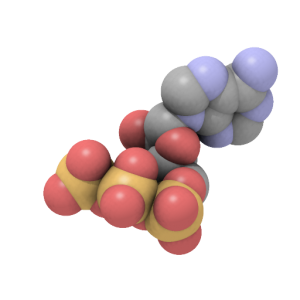Naturally-occurring compound creatine is arguably the best workout supplement.
![Creatine's molecular structure. By Ben Mills and Jynto [Public Domain], via Wikimedia Commons](https://supplementsinreview.com/wp-content/uploads/2016/01/Creatine-3D-balls-300x205.png)
- Boosting anaerobic exercise performance. Creatine helps the body replenish energy during high-intensity activity.
- Improving muscle and strength gains. Creatine helps you train harder and may directly influence muscle growth.
- Potentially enhancing exercise recovery. By protecting muscles from exercise-induced damage, creatine may improve recovery.
- Boosting brain function. Creatine maintains a healthy energy metabolism and reduces oxidative stress in the brain.
Overview
Creatine is an organic acid that occurs naturally in animals and humans. Creatine has a wide array of functions, but its primary role in the human body is to increase the supply of energy to muscle cells during short bouts of intense activity.
Some 95% of the body’s creatine is stored in skeletal muscle – the muscle tissue that we can grow through exercise and have voluntary control over; the remaining 5% is found in the brain, heart and testes. While a 70 kg man has about 120 g of creatine in his muscles, the average human body can store up to 160 g. This discrepancy explains why supplementation can enhance natural creatine levels and boost workout performance.
The human body produces creatine at a rate of about 1 g/day, with a diet based on meat and fish providing up to an additional 1 g daily. As a result, vegetarians tend to have lower creatine concentrations and respond better to supplementation.
With a long track record of safety and effectiveness, creatine is arguably the most popular workout supplement in the world today. The International Society of Sports Nutrition considers creatine, “The most effective nutritional supplement available today for increasing high-intensity exercise capacity and building lean mass.”

How Creatine Might Help PWO Formulas
Improved ATP regeneration during anaerobic activity

By supplying the energy needed to turn adenosine diphosphate (ADP) into ATP, creatine improves ATP regeneration during high-intensity activity.2
Potential modulation of proteins regulating muscle growth
Another biological activity of creatine may be the regulation of certain proteins that regulate muscle mass, although more research is needed to confirm this. For one, creatine supplementation may decrease myostatin, a protein which acts to inhibit muscle growth.
On the other hand, creatine appears to stimulate the expression of insulin-like growth factor 1 (IGF-1), protein which promotes muscle growth.34Creatine may also stimulate myosin heavy chain (MHC), another protein which promotes muscle protein synthesis.5

Potential antioxidant and calcium buffering activity
Creatine may also possess antioxidant properties that protect against oxidative stress – an important contributor to muscle fatigue and damage during exercise. A 2011 review paper noted that the reduction of muscle fatigue and inflammation via reduction of oxidation stress may be one of creatine’s less understood benefits.6
Furthermore, creatine may be able to enhance the calcium buffering capacity of muscle, which in turn decreases calcium influx and damage to muscle cell membranes following strenuous exercise.7
Creatine’s Benefits & Uses
Improved anaerobic performance
Creatine’s main benefit is improved performance during anaerobic exercise such as resistance training and sprint running, in addition to high-intensity sports such as soccer and football.89 Observable performance benefits include faster sprinting speed, higher number of exercise sets and repetitions before fatigue, and more weight lifted.
Increased muscle mass and strength gains
The second major benefit of creatine supplementation is increased muscle mass and strength gains when combined with resistance training. For example, one frequently-cited study found that creatine supplementation resulted in over twice the improvement in lean mass (4.3 kg vs 2.1 kg) compared to placebo during a 12 week weight training program, in addition to better strength improvements in the bench press and squat exercises.
Enhanced cognitive function
The third workout benefit of creatine supplementation may be improved brain function. Although this effect has no direct bearing on exercise performance, it may still act as an indirect boost. Specific study findings include improved scores on cognitive tests, improved mood and cognitive function during periods of sleep deprivation, and a general association between higher brain creatine levels and neuropsychological function.1011

Improved post-exercise recovery
Fourth, creatine may also protect against muscle damage and improve recovery after strenuous aerobic or anaerobic training. The most common research findings on this topic indicate that creatine supplementation resulted in reduced creatine kinase (CK) and lactate dehydrogenase (LDH) levels – enzymes which are recognized as markers of muscle damage. In addition, studies that questioned their participants reported reduced muscle soreness.12
Research
Animal Research
Animal research has attested to the safety and numerous workout benefits of creatine supplementation. Specific findings in rats include:
- Improved performance during brief bouts of high-intensity exercise1415
- Sparing of glycogen during intermittent high-intensity activity, resulting in more exercise bouts before exhaustion16
- Promotion of antioxidant activity, reducing the oxidative stress associated with exercise17
- Improved exercised-induced muscle growth (hypertrophy) and endurance exercise performance1819
Human Research
Creatine has been extensively researched as a workout aid over the period of more than two decades. The majority of trials report significant benefits.
Creatine (20 g) appears to reduce markers of muscle damage following strenuous exercise
Eight triathletes were randomly assigned to receive placebo or creatine (20 g) daily for 5 days prior to an Ironman triathlon – one of the most grueling sporting events in the world. Supplementation resulted in a decrease in two key markers of muscle damage: creatine kinase (CK) and lactate dehydrogenase (LDH). A secondary experiment in rats showed similar results.20
- The researchers concluded that “CrS presented a protective effect on muscle injury induced by strenuous contractile activities“21
Creatine (5 g) may enhance brain function, indirectly benefiting workout performance
This double-blind, placebo-controlled, crossover study tested the hypothesis that creatine supplementation could improve brain function. The researchers chose vegetarian and vegan subjects since their creatine levels are naturally lower and would respond better to supplementation. A total of 45 vegan and vegetarian adults were given placebo or 5 g creatine daily for 6 weeks, and then for another 6 weeks after a washout period.
The trial found that creatine supplementation improved brain function, as shown by improved scores on the Raven’s Advanced Progressive Matrices (RAPM) intelligence test, and the Wechsler Auditory memory test. Furthermore, the researchers proposed that the effect to be the same for people following a normal diet.
- The researchers concluded that “This trial of creatine supplementation showed beneficial effects of creatine on mental performance. These effects may add to the physical enhancement gained by athletes supplementing creatine levels…”22
Creatine may improve sprint but not endurance running performance
This study was one of many to examine whether creatine can aid endurance athletes. Twenty male subjects with no prior history of regular exercise were assigned to a placebo or creatine group. Creatine was supplemented through a 5-day loading period of 20 g/day and then a maintenance dose of 2 g/day for 6 more weeks. All participants performed a sprint and an endurance cycling test before supplementation, after loading phase, and at the end of supplementation. Creatine was found to improve sprint test performance, but had no effect on the endurance test.
- The researchers concluded that “Both short- and long-term creatine supplementation improve performance during repeated, supramaximal 12 s sprints on a cycle ergometer. However, whole-body and muscle oxidative capacity, substrate utilization rates during submaximal cycling exercise and endurance performance during a TT on a cycle ergometer are not affected”23
Creatine may increase muscle mass and strength during resistance training by supressing myostatin
This study tested the effect of resistance training plus creatine supplementation for 8 weeks on muscle strength, lean body mass, and myostatin levels (a protein which inhibits muscle growth) in 27 healthy men. The men were split up into 3 groups: control, resistance training plus placebo, and resistance training plus creatine 0.3 g/kg body weight daily for the first week, and 0.05 g/kg daily for 7 weeks. The study found that creatine plus resistance training reduced the levels of myostatin more than training alone.
- The researchers concluded that “the present study is the first to demonstrate that decreasing myostatin and inhibiting its function by GASP-1 may play important role in increasing muscle strength and mass by resistance training, and supplementation with creatine resulted in greater increases in muscle mass and strength, and this improvements were accompanied by more decreased myostatin levels.”24
Creatine (20 g) may improve sprint running performance
This study examined the effect of creatine supplementation on sprint running. Male sprinters were split up into 20 g/day creatine and placebo groups for 5 days. Each group performed a 1×100 m and 6×60 m sprints before and after supplementation. Following supplementation, the creatine group had improved speed for the 100 m sprint (11.68 m/second vs 11.59 m/s) and for five out of six 60m sprints (0.07-0.11 m/s improvement); total sprint time was also reduced by 0.51 seconds for the 6×60 m sprint.
- The researchers concluded that “this study suggests that sprint performance can be improved in male sprinters by 5 days of high dosage Cr supplementation”25
In this double-blind study, 19 healthy men were randomly assigned to either the creatine or placebo group and underwent continued resistance training for 12 weeks. The creatine group received 25 g/day for 1 week, followed by a maintenance dose of 5 g/day for the remainder of the trial.
While both groups improved physical performance, the creatine group had far better results: men given creatine gained 6.3% fat-free mass (FFM), had a 24% and 32% increase in bench press and squat, respectively, and a 35%, 36%, and 35% increase in Type I, IIA, and IIAB muscle fibers. By comparison, the placebo group gained only 3.1% FFM, 16% and 24% bench press and squat improvement, and an 11%, 15%, and 6% increase in the three muscle fiber types. Lastly, Muscle creatine was 22% higher in the creatine group, confirming that supplementation effectively raises naturally-present levels.
- The researchers concluded that “a 12-wk periodized heavy resistance training program resulted in significant increases in body mass, FFM, maximal strength, peak power, and skeletal muscle hypertrophy…Subjects who were loaded with 25 g creatine per day for 7 d followed by a maintenance dose of 5 g·d-1 experienced no side effects and greater gains in upper and lower body 1-RM strength, FFM, and muscle total creatine concentrations”26
Creatine (0.3 g/kg) may improve high intensity, intermittent exercise performance
This double-blind, crossover study examined the effects of creatine supplementation on high intensity exercise performance in squash players. Nine competitive players performed a “ghosting” routine consisting of 10 sets of 2 reps of simulated squash play, with 30 sec of rest in between sets. The players were then supplemented with 0.075 g/kg body weight creatine or placebo 4 times/day for 5 days, and the routine was repeated 4 weeks later. The creatine group improved mean sprint time by 3.2%, and sets 2 to 10 were completed in a significantly shorter time than placebo.
- The researchers concluded that “these data support existing evidence that Cr supplementation improves high intensity, intermittent exercise performance”27
Creatine may result in increased muscle mass gains for bodybuilders
This double-blind study looked at the effect of creatine supplementation in bodybuilders. For 6 weeks, 14 bodybuilders were split into placebo or 10 g creatine/daily groups. All participants followed a controlled diet and trained for 3 days a week, 120 minutes per session.
The creatine group gained roughly twice the amount of body mass – an average of 4.3 kg versus 2.1 kg for placebo. Furthermore, muscle girth also increased by roughly 2 times for the creatine group versus placebo, suggesting that most of the weight gain resulted from new muscle. In particular, the chest, thigh, and biceps muscles had significantly greater girth improvements for the creatine group.
- The researchers concluded that “the 6-week oral administration of creatine (10 g daily) to bodybuilders…brought about significantly greater increases in body mass and some body circumferences compared with the control group, both in the relaxed and contracted muscle states”28
Dosage for Pre-Workout
- The most common dosage used by researchers is the “loading” protocol, where a 20-25 g or 0.3 g/kg body weight creatine monohydrate is split into 4-5 doses taken daily for 5-7 days, and then a maintenance dose of 3-5 g or 0.03 g/kg is taken indefinitely
- Although loading is not required, the idea is that the higher dose will saturate muscle creatine levels, which can then be maintained with a smaller dose
- Alternatively, taking daily doses of 5 g or between 0.03 to 0.1 g/kg works fine as well
- Most single-ingredient creatine supplements recommend following the loading protocol, followed by 5 g daily
- Many pre-workout formulas do not include creatine because of its popularity as a standalone supplement, but those that do supply 1 – 3 g per serving
Side Effects
The most consistently reported side effect of creatine supplementation is short-term bodyweight gain. This is believed to be the result of creatine pulling more water into muscle cells, and may explain the “pumped” muscle appearance described by bodybuilders.29 Some people may also experience stomach discomfort or bloating after taking creatine.
Available Forms of Creatine
Creatine is available in many different powder forms. It is typically sold by itself, in a mixture of multiple creatine formulations, or with other pre-workout ingredients.
Creatine Monohydrate (CM). Creatine with a water molecule; CM is the most common and extensively studied form of creatine with clinically proven results. Most other forms of creatine have been shown to be as or less effective than CM.
Micronized Creatine. Same as CM, except the molecules of creatine have been reduced in size, making it easier to absorb.32
Buffered Creatine / Kre-Alkalyn®. A patented form which has been “buffered” to reach a higher pH, which is advertised as protecting creatine from converting into the waste byproduct creatinine. However, a study done on Kre-Alkalyn did not show any difference from normal creatine monohydrate in terms of improvements in strength, body composition, and anaerobic exercise performance.33
Creatine Anhydrous (CA). Creatine with the water molecule removed, allowing for higher creatine concentrations; otherwise not any different from normal CM.
Creatine Hydrochloride. Creatine bound to a hydrochloride salt group. This form is marketed as being more soluble in water than CM; because of this, most commercial products recommend taking smaller doses.
Creatine Magnesium Chelate / Creatine Magna Power®. Similar to Kre-Alkalyn, this patented form of creatine is advertised as protecting creatine from turning into creatinine. One study done on this formulation found it to be as effective as CM.34
Creatine Phosphate (CP). Also known as phosphocreatine, this is the primary form of creatine found in skeletal muscle. According to limited research, CP supplementation appears to be about as effective as CM for muscle growth and strength.35
Creatine Nitrate (CN). Creatine bound to nitrate. Only one study has been done on CN, which reports that it is safe to take.36
Creatine Pyruvate. CM combined with pyruvic acid. Pyruvic acid is believed to boost endurance exercise performance, so this formulation is proposed to be better for exercise involving both aerobic and anaerobic activity.37
Creatine Citrate. Creatine bound to citric acid. Similar to the pyruvate version, this form is believed to boost the work of creatine, since some studies have shown citrate supplementation to enhance exercise performance.
Creatine Effervescent. This form is advertised as having better absorption.
Supplements in Review Recommendation
- Creatine Monohydrate 5 g daily, Micronized Powder.
Creatine is a must-have addition to any pre-workout. With decades of research backing up its safety and efficacy, there’s no reason not to use creatine. Even if your workout doesn’t stress the anaerobic energy system, you can still benefit from improved recovery and a mild mental boost.
5 g daily is an easy dose to remember. While you can still follow the loading protocol, taking 5 g daily will still eventually max out your muscle creatine levels. Meanwhile, the micronization process makes creatine monohydrate easier to mix and absorb, which is especially useful for those that experience bloating or stomach discomfort after taking CM.
References
Leave a Reply